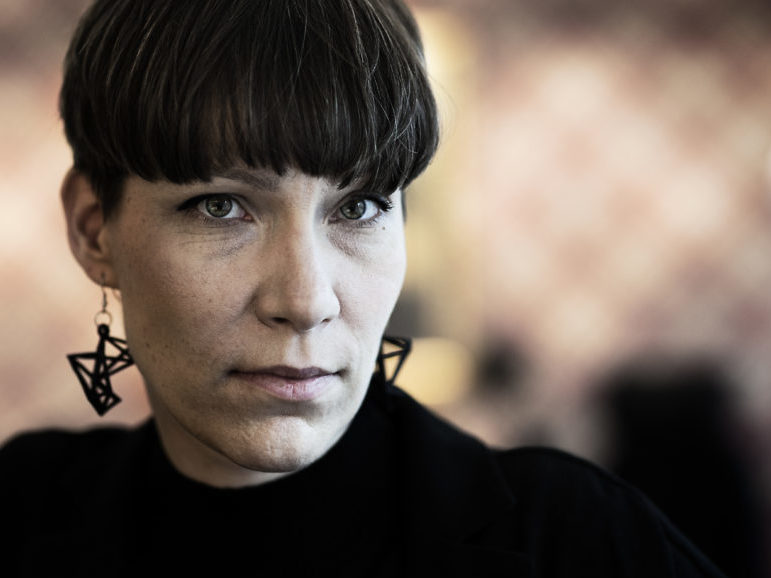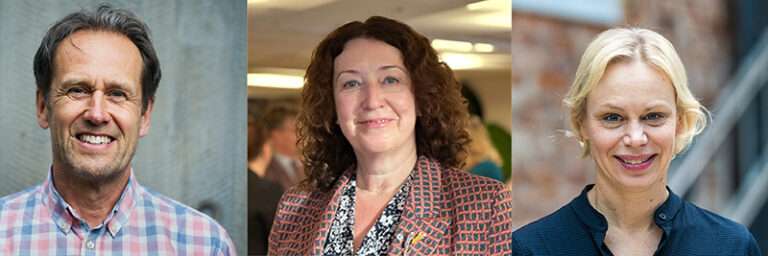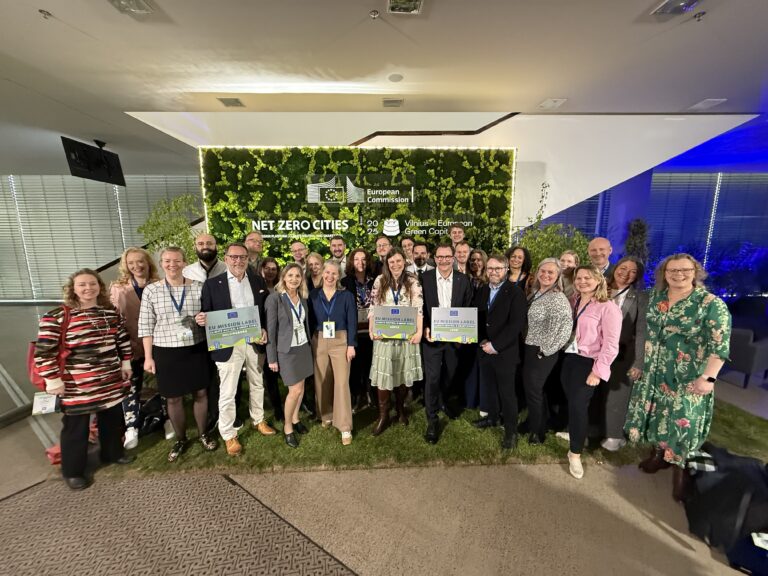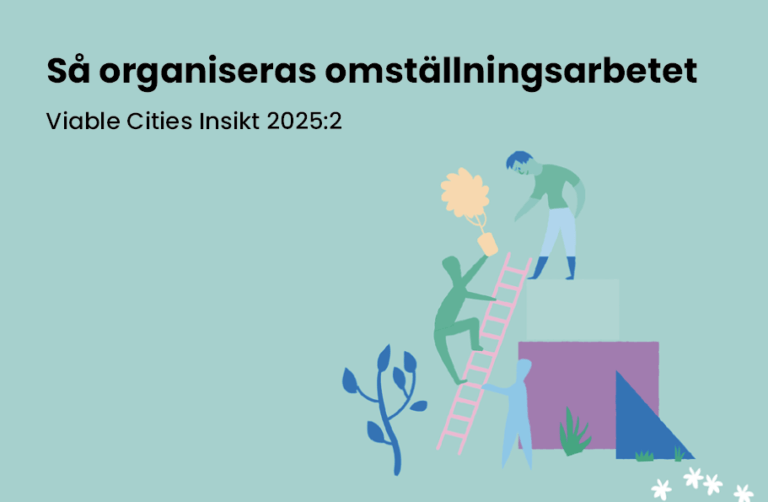In connection with the Almedalen Week in Visby, Viable Cities organized a seminar on July 2 with a focus on digitalization for the transition to climate-neutral cities.. Political representatives from Gothenburg, Umeå and Stockholm - Anne-Marie Hermansson, Hans Lindberg and Jan Valestad - presented their ambitions and efforts with a focus on digitalization to accelerate the transition. Three future spotters - Catharina Nauclér, Head of R&D at Fortum, Magnus Leonhardt, Head of Strategy and Innovation at Telia, and Darja Isaksson, incoming Director General of the Swedish innovation agency Vinnova - reflected on the cities' ambitions and initiatives. Darja Isaksson's foresight attracted a lot of interest and many asked to read the foresight afterwards. Here it is:
Our entire society is the result of humanity's ability to communicate, collaborate and innovate.
The results are amazing; science and education, health and vaccines, cities and complex supply chains allow more and more people to live with levels of comfort other generations could only dream of.
But what got us here is not enough.
Cities are growing, flows of people, goods, ideas and information are growing rapidly, and with them the climate and social impacts of such flows. We understand that we must transform our society, our cities, our welfare, our value chains and consumption patterns into something sustainable, and that we are in a hurry. Swedish researchers have formulated the need for a "Carbon law", the realization that an exponential development towards carbon-free is both possible and necessary. We need to halve carbon dioxide emissions every decade.
It is a huge challenge, but we have opportunities now that we never had before. Digitalization and automation provide opportunities to organize all kinds of resources; people, knowledge, vehicles, real estate spaces, more efficiently than before. We can change all our value chains into something sustainable. But to do so requires us to work together ecosystems from research and policy to business and public organisations in new ways and in more complex collaborations than before. Some sectors and cities need to lead the way, and I am glad that we have an ecosystem that is determined to do so.
What does it mean that we are actually really good at it? What can we imagine will be the result?
As a thought experiment, I have been thinking about my son Baltazar. In 2030, he will be 20 years old and will hold me and us in the room accountable for what we did and didn't do. Of course, like many parents, I wonder what the world will look like then. So here's a slightly philosophical take on the year 2030:
The retail apocalypse, which started in the US in 2017 and then rolled into Europe, has had a major impact on commercial real estate. They are used in completely different ways than today. For the most part, people run their errands from home, and have things delivered, in a mix of autonomous vehicles, drones and robots, right into the kitchen. It is not only clothes and food that are delivered to your home, but also medicines. Most health care is proactive and done at home. In your body, you have nanobots that keep track of any infection or vitamin deficiency, always automatically updating your daily supplements and food subscriptions. But for more serious things, such as cancer, you have blood tests in your home pharmacy, and the whole chain of care is immediately booked when it seems to need a closer look. When you have to travel to the hospital, the entire chain is planned directly from travel to the medical appointment, and this has had an impact on resource utilization all the way to the emergency room.
More and more premises are being used as 'multipurpose' for everything from rehabilitation to dental appointments (where they now regenerate teeth instead of filling them with plastic), which has meant a huge amount for social sustainability in the non-urban parts of Sweden, but also in the cities. The times you leave home, it is because you need to be social, to meet other people to create something or socialize, not to consume stuff or sit in an office.
The rest of the world is rapidly urbanizing, and this also affects Swedes' expectations and behaviours, especially in terms of consumption, where and how they work and travel. But also the cityscape. New manufacturing techniques have led to completely new trends in architecture, with shapes that previously seemed impossible. Buildings are both energy positive and increasingly characterized by smart materials that change properties with the weather, and cities are much greener when carbon sinks are a given. Sweden has become hugely successful with sustainable energy systems where intermittent energy sources are used efficiently along with a fast-growing energy storage industry.
Baltazar tells stories about what it was like when he was a child to younger cousins. That back then we had roads everywhere, trafficked by cars that we used 5% of the time, and shared so little that the roads took up 50% of the area in the cities. Crazy!" says his younger cousin Bianca, who has hardly ever experienced a real traffic jam. Now, all trips are automatically booked, and are seamless experiences that mix the best based on the traveler's needs, weather, and traffic conditions. Smart combinations of everything from bikes to pools of shared automated vehicles and public transport are the norm. The price for each trip is set dynamically, taking into account the climate impact and available alternatives, and virtually everything is fossil-free.
Longer journeys are now both climate-smart and very fast. Electrification and biofuels are a given, and we have become accustomed to supersonic speeds in both planes and trains. Sweden, true to form, has not made a decision, and Baltazar and I are both frustrated that you can now ride the Hyperloop between Copenhagen and Berlin in 30 minutes but not within Sweden. But we have hope. With changing land values due to climate change and increased ecotourism, the whole issue of fast transportation has started to get really hot politically.
The public discourse is also affected by the fact that Sweden has understood that with 10 million, we are ONE city in a global context. So there is no longer the same discussion about city vs. countryside, no one in the new generation in the labor market thinks nationally, whether it's about welfare benefits or the labor market.
Our implemented lifelong learning reform has given a major boost to an emerging market for physical environments focused on learning and collaboration in dynamic job constellations, and we are a world leader in translating knowledge from research into action, thanks to unique collaborative mechanisms from research, policy and international relations at all levels, to business and municipal reality. Sweden has made a major impact on policy from the EU level to other important international cooperation bodies.
Much of what I say sounds very optimistic, but I am well aware of the challenges. For example, we are building new vulnerabilities into society with this. But new vulnerabilities also came with industrialization, electrification and the emergence of global value chains in everything from finance to food. We can address them responsibly with wise regulations, functioning institutions and processes that allow us to learn about, and find solutions to, vulnerabilities as we go along. So if I have to choose, I see it as my responsibility to choose to be an optimist, and to act on it.
Because this is not about technology, but about people.
So I am very happy to see all of you here. There is a generation with the potential to transform society into a society with more opportunities, more knowledge, better health, more creativity and sustainable lifestyles. That generation is sitting here in this room. I believe that the only real threat to our success is fear, and that our most important resource is courage and perseverance. Our ability to see the opportunities, and to act on them together. And that ability is, after all, greater than ever before in human history. To succeed, we just need to do more of what makes us truly human: communicate, collaborate and innovate.




